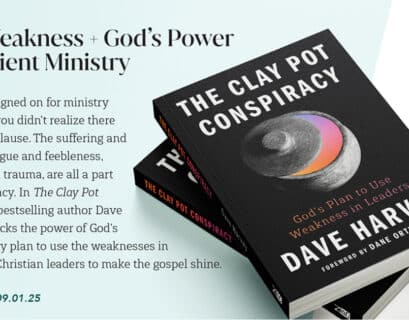This article was original published on The Gospel Coalition.
The moment arrives. Whispering a prayer for grace, the preacher stands and moves toward the front. He assumes a designated preaching spot—on a platform, behind a pulpit, adjacent to a table—it hardly matters. What matters is that he is not alone. The Holy Spirit is there.
But in what way? For what purpose? How does God’s Spirit work during a sermon? What should the preacher and people expect from the Spirit?
He Gifts the Preacher
Preacher, you are gifted. If that swells your head, you’ve missed the point. Gifts magnify the Giver, which in this case is the Holy Spirit (1 Cor. 12:7, 11):
As each has received a gift, use it to serve one another, as good stewards of God’s varied grace: whoever speaks, as one who speaks oracles of God. (1 Pet. 4:10)
And the Bible says your gift comes with instructions, two in particular:
1. Use it only to “serve one another.”
Preaching serves others when God is exalted and the listener receives grace—not when the gift is exalted and the preacher receives praise. This makes you a “good steward of God’s varied grace.”
2. Preach “as one who speaks the oracles of God.”
God’s Spirit has graced some to proclaim God’s Word. When they open the Bible to preach, their delivery should reflect the trembling wonder of one who re-speaks the very words of God.
If you’re cataloguing the ways the Holy Spirit works during a sermon, start with why it’s even you walking to the front. You deliver sermons because the Spirit delivers gifts. In this case, it’s to preach “as one who speaks oracles of God.”
He Inspires Unction
Ah yes, unction. An old-school word easier to experience than define. It conjures images of a preacher-in-polyester, confounding his hearers with impassioned irrationality. Lots of bellow with little Bible, great heat with flickering light. Unction seems to a preacher what a young lady is to a love-besotted lad—a phenomenon too mystifying to explain.
Or is it?
Unction happens when God’s Spirit kindles preachers to proclaim God’s Word with power (Acts 4:8). When unction comes, a bolt of lightning strikes the preacher’s affections and acumen for the truths being preached. Power is conveyed through the preached word (1 Thess. 1:5). The “unction” bolt hits both the preacher and the people.
The apostle Paul felt it. He told the Corinthians:
My speech and my message were not in plausible words of wisdom, but in demonstration of the Spirit and of power, so that your faith might not rest in the wisdom of men but in the power of God. (1 Cor. 2:4–5)
Paul’s talking unction here—that discernible combustion when the preacher’s soul and speech are divinely kindled. And when the Spirit arrives, the preacher ignites, and we all smell the smoke. “Preaching,” exclaimed Martyn Lloyd-Jones, “is theology coming through a man who is on fire.”
Unction is when God sets preachers ablaze. I’ll illustrate why I’m deeply grateful for it.
After traveling three days with little sleep, I arrived to a conference on the other side of the world. Exhausted, I stepped into the meeting room only to discover I was preaching in a few minutes. I walked nervously to the platform, wondering who was more vulnerable to sermon-napping—me, or the pastors gathered to listen. Visions of Eutychus—the dude who fell asleep as Paul preached and tumbled out the window (Acts 20:9)—danced in my head. Fortunately, the window sills were vacant. Unfortunately, so was my brain.
The next 45 minutes were a blur. All I know is another preacher arrived and spoke through my mouth. I mean, this guy was so much clearer, more passionate, and infinitely more interesting. It couldn’t be me. But it was me. Or maybe a better version of me. I don’t know; all I know is the Spirit arrived and sprinkled some unction.
I wish it happened more often.
How about you? Preachers should want unction. Spurgeon thought so, too. As Iain Murray observed, “Spurgeon had little sympathy for men who held an orthodox system which was devoid of the living unction of the Spirit.”
Sure, none of us is Spurgeon. But a step in his direction would include anticipating and celebrating the unction of the Spirit.
He Convicts Sinners
The Holy Spirit uses the folly of preaching to convict sinners. Specifically, he uses God’s Word flowing from man’s mouth as the instrument: “And when the Spirit comes, he will convict the world concerning sin and righteousness and judgment” (John 16:8).
Convicting grace begins with conversion. In Acts 2, the crowd heard Peter’s preaching and “they were cut to the heart” (Acts 2:37). The Spirit arrived and brought repentance. We came to Christ because conviction came to us through the Spirit’s power.
Exposing our fallen condition through preaching is not merely a one-time event, but an ongoing habit of the Holy Spirit. When he arrives, the ear hears a preacher’s language, but the soul feels the Spirit’s lash.
I’ve felt that love-inspired swat to the heart. Years ago, a sin lay hidden. Ashamed, I dodged probing questions and serious community. But for all my skill at hiding, I made one fatal miscalculation: I attended worship on the Lord’s Day. Sure enough, I fell under the sway of a convicting message. God’s Spirit sanded my heart, produced a convicting heat, and loaded my conscience with guilt. When the preacher invited the smitten to come forward, my feet hit the aisle so quickly I practically knocked over the preacher.
Happy is the preacher who catches a man after conviction has grown legs!
What happened? A preacher preached, the Word rang forth, the Spirit moved, and conviction fell. For me, it was a defining moment. For the Spirit, well, just another day of taking care of those he loves.
He Incites Affections for God
To be alive is to feel. We’re not, as one put it, “brains on a stick.” We are embodied souls. We hurt, we burn, we sigh, we seethe, we yell, we wound, we feel.
God knows this. We are made in his image. It pleases him to save and sanctify us through the folly of preaching, so that his work can never be reduced to a mere rational exchange. “The greatest hindrance to good preaching,” Princeton sage Archibald Alexander wrote, “is the want of right feeling.” Indeed, a great hindrance to good preaching is assuming it should produce no experience, no affections, no feelings at all.
Enter the Holy Spirit.
He arrives, because knowing God includes experiencing God. He works through preaching to incite genuine affections for God. If, as Jonathan Edwards claims, “true religion consists in holy affections,” then arousing holy affections must be a primary goal for the Spirit when the Bible is preached.
It’s about more than just right thoughts of God. The Spirit helps you “love the Lord your God with all your heart and with all your soul and with all your mind and with all your strength” (Mark 12:30). The Spirit rallies your whole being—affections and emotions included—to respond to God’s love with our our own (1 John 4:19).
Solid gospel preaching, carried along by the Spirit, becomes the ward where holy affections are born.
Preacher, have you ever had this experience? Someone comes to you profoundly touched by something you never said in the sermon. Yet, there they stand, absolutely convinced God has spoken to them through you. And he has! Wise is the pastor who knows there are always two sermons being preached—the one we proclaim, and the one the Holy Spirit applies. And when the Spirit applies, people experience God.
Through preaching, the Holy Spirit becomes the delivery system that connects the proclaimed Word to our experience of God—sometimes in ways that are “powerful and visible.” At the transforming intersection of Spirit and truth, God meets us and we are changed.
Fade and the Flash
The moment continues. The preacher lifts his voice, quiet and confident. He is not alone. Because God loves both the preacher and the church, his Spirit is there.
The preacher fades, the Word detonates, and in the flash of surprising power, God looks glorious.
If you found this article helpful, be sure to check out this podcast interview featuring Zack Eswine.












